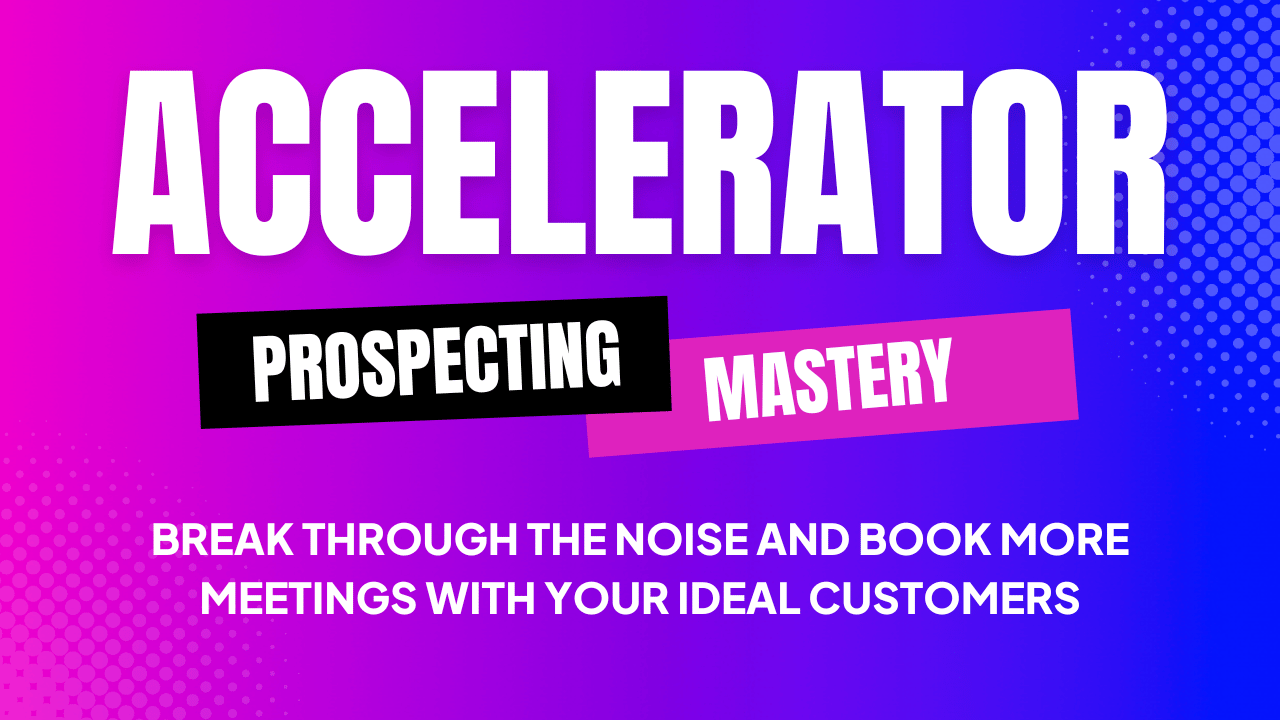Read time: 5 minutes
Welcome to the Succession newsletter where 500+ life science sales reps improve their skills in 5 minutes per week. If you’re getting value from these newsletters, we'd love it if you could forward it along to your sales colleagues. If you’re new here, subscribe below.


48% of life science sales reps say that prospecting (getting a first meeting) is the hardest part of their job right now.
The sales leaders we speak with are saying top-of-funnel pipeline generation is the biggest gap towards hitting their number.
We’ve heard feedback from our community that the training and content are great, but sometimes you need accountability to show up and do it!
Starting Oct 7, we’re launching a 4-week Prospecting Mastery Accelerator.
Each week we will host a live 1hr training session (virtually) focused on a specific area of prospecting.
You’ll have the opportunity to learn and ask questions about your business and your specific challenges.
After each session, there will be online discussion in our private community exclusively for Accelerator members, a place for you to network, plus access to the video recordings, templates, and takeaways from each session.
We will also have an optional live office hour session to review messaging or get your questions answered.
You’ll also get a Certification to take back to your company and post on LinkedIn after completing the Accelerator Program.
The 4-week program starts October 7 and we'll cover:
How to write magnetic prospecting messages that increase your reply rate and get prospects to take action
How to build target prospect lists that encompass your total addressable market and where to prioritize your effort
How to use different tools to find unique data points to write the types of messages your competitors can’t
How to leverage AI across prospecting workflows from research to personalizing messaging at scale
Learn more about the prospecting mastery accelerator below

Back in newsletter #37, we discussed how to differentiate yourself from the alternative solutions in the market. This concept is not just about knowing your unique advantages but getting prospects to see why they need what makes you different. To accomplish this, you need to share expert insights—deep, experience-based perspectives that reshape how prospects view different problems or opportunities.
Why Expert Insights Matter
Sales reps often fall into the trap of solving only the problems a prospect has already identified. This approach tends to commoditize conversations because the prospect is likely sharing these same needs with several competitors. As a result, the conversation revolves around fulfilling known requirements, which puts reps in a race to the bottom, competing mainly on price or incremental features. To differentiate yourself, you must transition the conversation beyond what the prospect already knows.
Enter Expert Insights. These are perspectives grounded in deep industry knowledge and experience, which enable you to highlight aspects of the customer’s needs that they haven’t yet considered (also known as unconsidered needs). By sharing these insights, you help prospects reframe how they see their needs, shifting the focus to unconsidered needs that, if unaddressed, could negatively impact their project. This strategy not only differentiates you but also adds value, transforming you from a vendor into a trusted advisor.
Tying Unconsidered Needs to Your Differentiated Capabilities
Good sales reps know what the customer isn’t factoring into their decision-making process. The best reps take this a step further. They guide customers to specific unconsidered needs so their solution is the only one that can address them. By asking third and fourth-level questions, sharing expert insights, and using stories from past customers, top reps get prospects to prioritize those needs that only their solution can solve.

Step-by-Step Process to Leverage Expert Insights
Here’s a five-step process to follow in order to create your own expert insights:
Step 1: Find Your Unique Differentiators and Their Outcomes
The first step is to clearly understand what makes your product or service different from the competition. But knowing your differentiators isn’t enough, you need to connect them to the outcomes they create for your customers. See How to Differentiate for more details on this process.
Ask yourself: What unique value does my solution offer? How does this create unique outcomes for my customers?
Step 2: Identify Unconsidered Needs
Once you’ve defined your unique outcomes, it’s time to consider what your prospects are overlooking. These could be unmet needs, misconceptions, or biases that cloud their decision-making process.
Ask yourself: What unconsidered needs do my prospects have? What misconceptions might they be operating under? What biases do have?
Step 3: Create a Unique Point of View
After identifying these unconsidered needs, you need to craft a point of view that explains why the prospect should care. This perspective should be based on your deep expertise and backed by industry knowledge. Your insight should teach the customer why this need matters and how addressing it will lead to better outcomes.
Ask yourself: What unique perspective can I share that will make my prospect rethink their current approach?
Step 4: Back Up Your Point of View with Data
A strong insight needs to be supported by data. You can reference publications, customer case studies, or internal/external data to back up your point of view. This not only builds credibility but also helps the prospect feel confident that they’re making a sound decision based on evidence, not just opinions.
Ask yourself: What data do I have that supports my insight? How can I present this data in a way that reinforces my differentiation?
Step 5: Guide the Prospect with Questions
Nobody likes being told what to think or do (especially scientists who are naturally skeptical). To lead the prospect toward your point of view, ask guiding questions that make them realize the importance of addressing the unconsidered need. This approach allows the prospect to come to their own conclusions, making them more likely to trust your expertise and value your insights.
Ask yourself: What questions can I ask that will help my prospect recognize the importance of the unconsidered need?
Example for Synthego (CRISPR gene editing company)
Unique Differentiator: We can achieve extremely high editing efficiency at the pool stage across many different cell types. Deliver in 3 weeks vs 4 months for clones.
Differentiated Value: You can test a vast number of edit to cell line combinations to generate more data and find hits with the same budget you’d spend on a single clone.
Common Misconceptions: You need a clonal cell line to generate any reliable data. This is true if (like most people) you get poor editing efficiency at the pool stage.
Insight: You may not always need a clone. Many assays can be run on a polyclonal population of cells if the editing efficiency is high enough.
I’d want to ask questions to understand their assays, their timelines, the number of experiments they wish they could run, etc… Then I can share my expert insight that ties back to our unique differentiators. I’ll share data and customer stories to back up my claims. Ultimately this positions our company in a way that no other competitor would be able to compete with us.
The Power of Expert Insights in Sales
Expert insights are a powerful tool for moving beyond commoditized conversations and engaging prospects in a more meaningful, value-driven discussion. When you can tie unconsidered needs to your unique differentiators, you create a compelling reason for prospects to choose your solution over others. This approach builds trust, demonstrates expertise, and positions you as more than just another vendor.
Sometimes, just by sharing these insights, prospects will want to work with you even if your product or service isn’t that differentiated. They will be more likely to trust you and your expertise vs someone who just talks about features and benefits.
Once you have your expert insight, you can use it in your prospecting messaging, in discovery calls, in your content, etc… It should be a cornerstone of how you talk about the challenges your customers face.


Episode 45: [Sales] The differences in selling products, services, software, and instruments with Malek Haddad
Value selling is relevant no matter what you sell
Data is the output that everyone cares about
Your message needs to match the level of the person
Always be multi-threading to win deals


Lead Generation: We’ll build target lists, write scientifically relevant messaging, and send messages on your behalf to book qualified sales meetings with biotech and pharma companies.
Succession for Reps: A skill development platform for life science sales reps who want to improve their sales skills, exceed their quota, and take the next step in their career.
Succession for Teams: If you want to upskill your team around prospecting, driving to close, key account management, AI, or any other topic, we can put together a training plan specific to your organization’s needs.
Strategy Call: Need more than training? Want help implementing and executing your sales strategy? In a 30-minute call, we will assess your company’s current situation and identify growth opportunities.


Special Offer: If you’ve made it this far, you can use the coupon code NEWSLETTER to get 20% off an individual Succession membership.
Recommended Products & Tools: We’ve used every one of these products and can highly recommend them to you. Everything from CRMs to AI tools.
Join SAMPS: A free community of sales and marketing professionals of the sciences. They run in-person events and put on regular webinars packed with great content.

